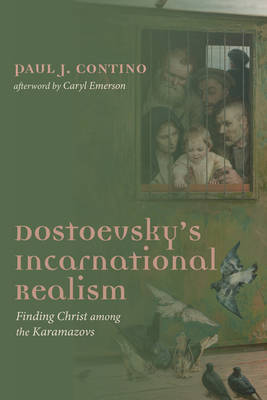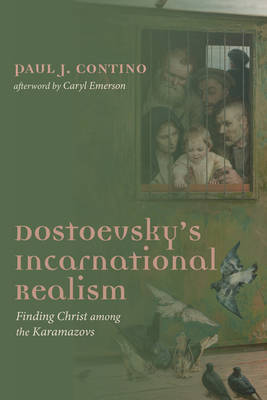
Bedankt voor het vertrouwen het afgelopen jaar! Om jou te bedanken bieden we GRATIS verzending (in België) aan op alles gedurende de hele maand januari.
- Afhalen na 1 uur in een winkel met voorraad
- In januari gratis thuislevering in België
- Ruim aanbod met 7 miljoen producten
Bedankt voor het vertrouwen het afgelopen jaar! Om jou te bedanken bieden we GRATIS verzending (in België) aan op alles gedurende de hele maand januari.
- Afhalen na 1 uur in een winkel met voorraad
- In januari gratis thuislevering in België
- Ruim aanbod met 7 miljoen producten
Zoeken
Dostoevsky's Incarnational Realism
Finding Christ Among the Karamazovs
Paul J Contino
Paperback | Engels
€ 44,45
+ 88 punten
Uitvoering
Omschrijving
In this book Paul Contino offers a theological study of Dostoevsky's final novel, The Brothers Karamazov. He argues that incarnational realism animates the vision of the novel, and the decisions and actions of its hero, Alyosha Fyodorovich Karamazov. The book takes a close look at Alyosha's mentor, the Elder Zosima, and the way his role as a confessor and his vision of responsibility "to all, for all" develops and influences Alyosha. The remainder of the study, which serves as a kind of reader's guide to the novel, follows Alyosha as he takes up the mantle of his elder, develops as a "monk in the world," and, at the end of three days, ascends in his vision of Cana. The study attends also to Alyosha's brothers and his ministry to them: Mitya's struggle to become a "new man" and Ivan's anguished groping toward responsibility. Finally, Contino traces Alyosha's generative role with the young people he encounters, and his final message of hope.
Specificaties
Betrokkenen
- Auteur(s):
- Uitgeverij:
Inhoud
- Aantal bladzijden:
- 334
- Taal:
- Engels
Eigenschappen
- Productcode (EAN):
- 9781725250741
- Verschijningsdatum:
- 17/08/2020
- Uitvoering:
- Paperback
- Formaat:
- Trade paperback (VS)
- Afmetingen:
- 152 mm x 229 mm
- Gewicht:
- 494 g

Alleen bij Standaard Boekhandel
+ 88 punten op je klantenkaart van Standaard Boekhandel
Beoordelingen
We publiceren alleen reviews die voldoen aan de voorwaarden voor reviews. Bekijk onze voorwaarden voor reviews.









